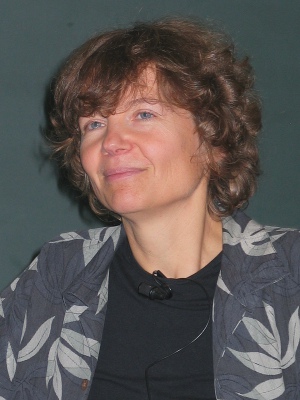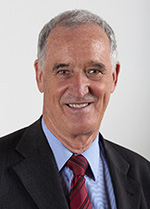| Time | Tue, July 11 | Wed, July 12 | Thu, July 13 | Fri, July 14 |
|---|---|---|---|---|
| 08:00-08:45 | Registration | Registration | Registration | |
| 08:45-09:00 | Opening | |||
| 09:00-10:00 | Workshop Day | Keynote – Susanne Graf Specification and Verification for MIMOS, our Framework for Design and Update of Real-Time Embedded Systems | Keynote – Hermann Kopetz Design Principles for Reducing the Complexity of Safety-Critical Embedded Systems | |
| 10:00-10:30 | Workshop Day | Coffee Break | Coffee Break | Coffee Break |
| 10:30-12:00 | Workshop Day | Session 1: (Scheduling) To Schedule or not to Schedule | Session 3: (Multicore/Multiprocessor) The More, the Merrier | Session 5: (Timing analysis) Time, time time, see what’s become of me |
| 12:00-13:30 | Lunch Break | Lunch Break | Lunch Break | |
| 13:30-15:00 | Workshop Day | Session 2: (Architectures and Network) Architecture should speak of its time and place, but yearn for timelessness | Session 4: (CPS) Control, control, you must learn control | Session 6: (Outstanding papers) We are the champions |
| 15:00-15:30 | Coffee Break | Coffee Break | Coffee Break | |
| 15:30-17:00 | Workshop Day (till 18:00) | Real-time pitches (WiP + Journal first + Demos + …) (till 16:30) | Industrial Challenge | Concluding Remarks and Award Ceremony (till 16:00) |
| Social Events | First-Timer Reception (18:00-19:00) | Poster & Demo session and reception (17:00-19:00) | Social Activity and Conference Dinner (18:00-23:00) |
Keynote: Specification and Verification for MIMOS, our Framework for Design and Update of Real-Time Embedded Systems (The slides can be found here)
Chair: Steve Goddard (University of Iowa, USA)
Abstract: Traditionally, critical software in embedded real-time systems is statically verified, and once certified supposed to remain valid for the lifetime of the system itself. Modern systems, evolving in more and more open and evolving contexts impose new requirements on embedded software. MIMOS proposes a paradigm shift to respond to these challenges by means of a combination of features: (1) it is high-level and strictly model-based concerning functional and non-functional aspects to guarantee intuitive concepts to the designer whose semantics is preserved. (2) It proposes a framework for static and dynamic (monitoring-based) verification of functionality and timing completing each other. (3) Finally, our ultimate goal is allowing to ease update of critical software. The talk will give an overview on the MIMOS concepts and the tool environment for embedded and real-time systems design developed in Uppsala within Wang Yi’s ERC CUSTOMER project. Particular focus will be on the specification and verification framework that we are developing in this context.
Bio: Susanne Graf is a research professor (Directeur de Recherche CNRS) at VERIMAG of Grenoble University. She has a PhD in Computer Science from Polytechnical Institute of Grenoble. Her Research interest has always been focused on formal approaches to design and verification in different application domains. Today her main interest is design and analysis of embedded real-time systems. In 2022 she received the CAV award for her pioneering work on predicate abstraction.

Keynote: Design Principles for Reducing the Complexity of Safety-Critical Embedded Systems (The slides can be found here)
Chair: Peter Puschner (TU Wien, Austria)
Abstract: System Architecting deals with the decomposition of a large complex system into almost independent parts in order to reduce the implementation and validation efforts by applying the time-tested design principle divide et impera. In this presentation, we present some additional proven design principles for decomposing complex safety-critical embedded systems using the control system of a fully autonomous vehicle as an example. With the current state of the art in hardware and software, it is impossible to achieve the required safety goals of such a large complex computer system by implementing a non-fault tolerant monolithic computer architecture. We need to find a decomposition into independent Fault Containment Units (FCUs) such that a Byzantine failure of any complex FCU can be mitigated by the other correct FCUs without causing a catastrophic incident. We start by the establishment of the required safety goals and propose to make a clear distinction between the two important use cases: (i) correct behavior under well-specified nominal conditions, and (ii) safe behavior under off-nominal conditions, which cannot be fully specified in advance.
Bio: Hermann Kopetz is professor emeritus at TU Wien. He received a PhD degree in Physics sub auspiciis praesidentis from the University in Vienna in 1968. Kopetz is the chief architect of the time-triggered technology for dependable embedded Systems and a co-founder of the company TTTech. The time-triggered technology is deployed in leading aerospace, automotive and industrial applications. Kopetz is a Life Fellow of the IEEE and a full member of the Austrian Academy of Science. Kopetz served as the chairman of the IEEE Computer Society Technical Committee on Dependable Computing and Fault Tolerance and in program committees of many scientific conferences. He is a founding member and a former chairman of IFIP WG 10.4. Kopetz has written a widely used textbook on Real-Time Systems—the third edition has been published in 2022— and authored more than 400 papers. In June 2007 he received the honorary degree of Dr. honoris causa from the University Paul Sabatier in Toulouse, France.

Session 1: (Scheduling)
To Schedule or not to Schedule
Chair: Yasmina Abdeddaïm (Université Gustave Eiffel, ESIEE Paris, France)
- Towards Efficient Explainability of Schedulability Properties in Real-Time Systems (doi)
Sanjoy Baruah (Washington University in St. Louis), Pontus Ekberg (Uppsala University) - The Safe and Effective Use of Low-Assurance Predictions in Safety-Critical Systems (doi)
Kunal Agrawal (Washington University in St. Louis), Sanjoy Baruah (Washington University in St. Louis), Michael Bender (Stony Brook University), Alberto Marchetti-Spaccamela (La Sapienza Roma) - Precise Scheduling of DAG Tasks with Dynamic Power Management (doi)
Ashik Ahmed Bhuiyan (West Chester University), Mohammad Pivezhandi (Wayne State University), Zhishan Guo (North Carolina State University), Jing Li (New Jersey Institute of Technology), Venkata Prashant Modekurthy (University of Nevada, Las Vegas), Abusayeed Saifullah (Wayne State University)
Session 2: (Architectures and Network)
Architecture should speak of its time and place, but yearn for timelessness
Chair: Renato Mancuso (Boston University, USA)
- Quasi Isolation QoS Setups to Control MPSoC Contention in Integrated Software Architectures (doi)
Sergio Garcia-Esteban (Barcelona Supercomputing Center (BSC) and Unviersitat Politecnica de Catalunya), Alejandro Serrano-Cases (Barcelona Supercomputing Center (BSC)), Enrico Mezzetti (Barcelona Supercomputing Center (BSC) and Rapita Systems S.L.), Jaume Abella (Barcelona Supercomputing Center (BSC)), Francisco J. Cazorla (Barcelona Supercomputing Center (BSC) and Rapita Systems S.L.) - FusionClock: Energy-Optimal Clock-Tree Reconfigurations for Energy-Constrained Real-Time Systems (Artifact Evaluated and Approved) (doi, artifact)
Eva Dengler (Friedrich-Alexander Universität Erlangen-Nürnberg (FAU)), Phillip Raffeck (Friedrich-Alexander Universität Erlangen-Nürnberg (FAU)), Simon Schuster (Friedrich-Alexander Universität Erlangen-Nürnberg (FAU)), Peter Wägemann (Friedrich-Alexander Universität Erlangen-Nürnberg (FAU)) - Isospeed : Improving (min,+) Convolution by Exploiting (min,+)/(max,+) Isomorphism (Artifact Evaluated and Approved) (doi, artifact)
Raffaele Zippo (Università di Pisa), Paul Nikolaus (TU Kaiserslautern), Giovanni Stea (Università di Pisa)
Session 3: (Multicore/Multiprocessor)
The More, the Merrier
Chair: Angeliki Kritikakou (Univerity of Rennes 1, IRISA/INRIA, France)
- Optimal Multiprocessor Locking Protocols under FIFO Scheduling (doi)
Shareef Ahmed (University of North Carolina at Chapel Hill), Jim Anderson (University of North Carolina at Chapel Hill) - A Tight Holistic Memory Latency Bound Through Coordinated Management of Memory Resources (doi)
Shorouk Abdelhalim (McMaster University), Danesh Germchi (University of Waterloo), Mohammed Ismail (McMaster University), Rodolfo Pellizzoni (University of Waterloo), Mohamed Hassan (McMaster University) - Replication-Based Scheduling of Parallel Real-Time Tasks (doi)
Federico Aromolo (Scuola Superiore Sant’Anna – Pisa), Geoffrey Nelissen (Eindhoven University of Technology), Alessandro Biondi (Scuola Superiore Sant’Anna – Pisa)
Session 4: (CPS)
Control, control, you must learn control
Chair: Karl-Erik Årzén (Lund University, Sweden)
- Bounding the Data-Delivery Latency of DDS Messages in Real-Time Applications (doi)
Gerlando Sciangula (Pisa Huawei Research Center and Scuola Superiore Sant’Anna – Pisa), Daniel Casini (Scuola Superiore Sant’Anna – Pisa), Alessandro Biondi (Scuola Superiore Sant’Anna – Pisa), Claudio Scordino (Pisa Huawei Research Center), Marco Di Natale (Scuola Superiore Sant’Anna – Pisa) - A New Perspective on Criticality: Efficient State Abstraction and Run-time Monitoring of Mixed-Criticality Real-time Control Systems (Artifact Evaluated and Approved) (doi, artifact)
Tim Rheinfels (FAU Erlangen-Nürnberg), Maximilian Gaukler (FAU Erlangen-Nürnberg), Peter Ulbrich (TU Dortmund) - Consensual Resilient Control: Stateless Recovery of Stateful Controllers (doi)
Aleksandar Matovic (SnT, University of Luxembourg), Rafal Graczyk (SnT, University of Luxembourg), Federico Lucchetti (SnT, University of Luxembourg), and Marcus Völp (SnT, University of Luxembourg)
Session 5: (Timing analysis)
Time, time time, see what’s become of me
Chair: Georg von der Brüggen (TU Dortmund, Germany)
- Scheduling and compiling rate-synchronous programs with end-to-end latency constraints (doi)
Timothy Bourke (Inria/ENS), Vincent Bregeon (Airbus), Marc Pouzet (ENS/Inria) - CAWET: Context-Aware Worst-Case Execution Time Estimation Using Transformers (doi)
Abderaouf Nassim Amalou (Univ Rennes, INRIA, CNRS, IRISA, Rennes), Isabelle Puaut (Univ Rennes, INRIA, CNRS, IRISA, Rennes), Elisa Fromont (Univ. Rennes, IUF, INRIA, CNRS, IRISA, Rennes) - Impact of transient faults on timing behavior and mitigation with near-zero WCET overhead (doi)
Pegdwende Romaric Nikiema (Univ Rennes, INRIA, Irisa), Angeliki Kritikakou (Univ Rennes, INRIA, Irisa), Marcello Traiola (Univ Rennes, INRIA, Irisa), and Olivier Sentieys (Univ Rennes, INRIA, Irisa)
Session 6: (Outstanding papers)
We are the champions
Chair: Alessandro V. Papadopoulos (Mälardalen University, Sweden)
- Memory Latency Distribution-Driven Regulation for Temporal Isolation in MPSoCs (doi)
Ahsan Saeed (Robert Bosch GmbH), Denis Hoornaert (Technical University of Munich), Dakshina Dasari (Robert Bosch GmbH), Dirk Ziegenbein (Robert Bosch GmbH), Daniel Mueller-Gritschneder (Technical University of Munich), Ulf Schlichtmann (Technical University of Munich), Andreas Gerstlauer (The University of Texas at Austin), Renato Mancuso (Boston University) - On the Equivalence of Maximum Reaction Time and Maximum Data Age for Cause-Effect Chains (doi)
Mario Günzel (TU Dortmund University), Harun Teper (TU Dortmund University), Kuan-Hsun Chen (University of Twente), Georg von der Brüggen (TU Dortmund University), Jian-Jia Chen (TU Dortmund University) - Low-overhead Online Assessment of Timely Progress as a System Commodity (doi)
Weifan Chen (Boston University), Ivan Izhbirdeev (Boston University), Denis Hoornaert (Technical University of Munich), Shahin Roozkhosh (Boston University), Patrick Carpanedo (Boston University), Sanskriti Sharma (Boston University), Renato Mancuso (Boston University)
Attending virtually? You can interact with the authors on Discord.
